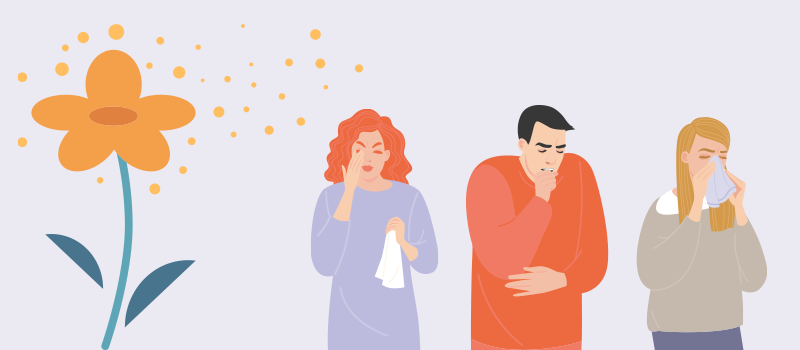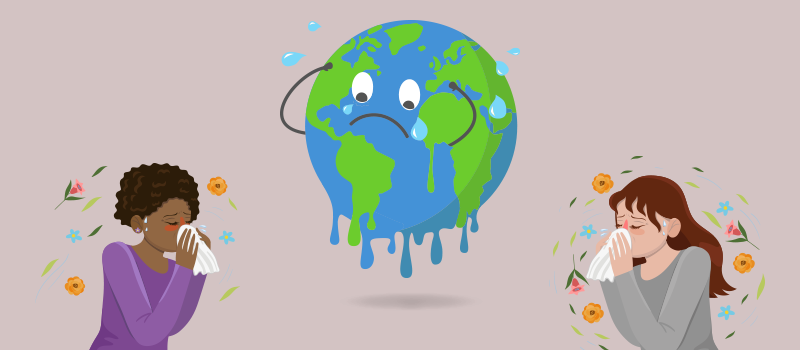What’s the Buzz
The Bee Healthy Blog
Can You Develop Allergies as an Adult?

Some 50 million Americans suffer from allergies. They can affect people of any age group, gender, or race. Most people first develop allergy symptoms at a young age and outgrow them by their 20s and 30s, but you can develop an allergy at any age. You can even suddenly become allergic to something you never had a problem with before.
The reason for adult-onset allergies remains unclear. Please continue reading to learn more about why allergies develop during adulthood and how you can treat them.
What are allergies?
Allergies occur in response to a normally harmless foreign substance — such as pet dander, bee venom, dust mites, pollen, or a food item. This foreign substance, called an allergen, does not cause a problem in most people. But in some people, the immune system mistakenly identifies the allergen as harmful and mounts an attack.
The immune system produces a substance called immunoglobulin E or IgE antibodies to fight off the allergen. When a person comes in contact with specific allergens, the corresponding immunoglobulin E identifies it. The immune system responds with a chain of events, ultimately leading to the release of a chemical called histamine. Histamine causes the affected person to experience allergy symptoms.
These allergic symptoms can be in the form of allergic rhinitis or hay fever (runny nose, stuffy nose, sinus inflammation) or allergic reactions in the skin (rash, hives, itchiness), digestive system (abdominal pain, nausea, vomiting), or the airways in the lungs (shortness of breath, coughing, wheezing).
Can adults suddenly develop allergies?
Yes, it’s possible for adults to suddenly develop environmental allergies and other allergies. In other words, there is no age limit for a person to develop allergies to certain substances. For example, even if you’ve never had a problem with pollen before, you can all of a sudden start experiencing allergy symptoms from exposure to pollen.
Why would I suddenly develop allergies?
While most people develop adult-onset allergies in their 20s and 30s, it’s possible to develop allergies later in life as well. It remains unclear why allergies develop during adulthood. There is a genetic component, i.e., allergies can be inherited. Meaning, you have a higher risk of developing allergies if you have a family history of allergies.
Other risk factors for developing allergies as an adult include severe allergies during childhood. It may not be the same allergy. So, if you had food allergies as a child or a skin condition like eczema, you could develop seasonal allergies when you’re older with itching, runny nose, sneezing, watery eyes, and sore throat.
Other reasons for adult-onset allergies may include:
- Exposure to allergens during a period when your immune system is weak, such as when you’re sick.
- Exposure to new allergens after relocating to a new city, home, or workplace.
- Exposure to allergens through a new pet or keeping a pet after a long time.
- Exposure to high levels of an allergen for the first time as an adult (you may have been exposed to the allergen as a child, just not at sufficient levels to trigger your immune system).
What triggers allergies in adults?
Seasonal Allergies
Environmental allergies are the most common type of adult-onset allergies. They can be triggered by pollen, mold, animal dander, dust mites, ragweed, and other airborne allergens that tend to spike at certain times of the year, usually in the spring or fall.
Food Allergies
Certain foods can cause allergy symptoms in children and adults. Indeed, it is estimated that 1 in 10 adults in the US has a food allergy. What’s more, nearly half of these food allergies are adult-onset allergies. The most common food allergies include seafood allergies (fish and shellfish), peanuts, and tree nuts (almonds, walnuts, cashews, pecans). You can also develop a food allergy to fruit and vegetable pollen.
Pet Allergies
Human immune systems can react to certain allergens from pets, such as pet dander (skin flakes) and chemicals in the pet’s urine or saliva.
Insect Sting Allergies
Wasps, honey bees, yellow jackets, and hornets are the most common stinging insects found in the US. Some people develop severe reactions to insect stings with hives, swelling, and itching at the sting site. Rarely, you can have severe allergies to insect stings with serious symptoms such as chest tightness, breathing difficulty, and swelling of the tongue or throat. An insect sting allergy requires immediate medical attention.
Drug Allergies
Certain medications (most commonly penicillin antibiotics) can cause allergy symptoms in some people. Symptoms can include hives, itching, swelling, wheezing, and anaphylaxis (this is a potentially life-threatening allergic reaction that involves multiple body systems).
Can allergies go away with time?
Yes, all types of allergies, including adult-onset allergies, can go away in your 50s and beyond. Your immune function reduces with age, and therefore, your immune response to allergens tends to be less severe when you’re older.
What are the treatments for adult-onset allergies?
Allergies can affect every aspect of a person’s life. If you think you’ve developed allergies, it’s important to visit your healthcare provider. Doctors can diagnose an allergy based on your symptoms and allergy testing (allergy and blood tests). You should work with your doctor to develop a treatment plan. Some of the possible treatments for an allergy include:
- Prescription or over-the-counter antihistamines such as diphenhydramine (Benadryl) or cetirizine (Zyrtec) to control your allergy symptoms. Antihistamine medications are available as pills and nasal sprays. Your doctor may ask you to take them at the start of allergy season for prevention.
- Allergy injections (immunotherapy) work like a vaccine. They can help to slowly build your tolerance to allergy triggers. You may need to take allergy shots regularly for a few years.
- Epinephrine auto-injector (EpiPen) is a life-saving device that can help to reverse severe allergy symptoms such as a drop in blood pressure, throat swelling, and difficulty breathing. It is used in case of accidental exposure, such as an insect sting or exposure to other allergens that cause severe reactions.
Wrapping Up
Allergies are fairly common and you can develop them at any age, including as an adult. Most allergies are mild, but very rarely, you can develop potentially life-threatening reactions such as anaphylaxis that require you to seek emergency medical help and specialized care.
Some allergies can fade over time. Most allergies can't be cured, but treatments can help to relieve your allergy symptoms and keep them under control.
If you notice a potentially new allergy, see your doctor to find out for sure and discuss treatment options.
References:
- https://www.mayoclinic.org/diseases-conditions/allergies/symptoms-causes/syc-20351497
- https://my.clevelandclinic.org/health/diseases/8610-allergy-overview
- https://www.ncbi.nlm.nih.gov/pmc/articles/PMC2805592/
- https://jamanetwork.com/journals/jamanetworkopen/fullarticle/2720064
- https://acaai.org/allergies/allergic-conditions/insect-sting-allergies/#











SOCIAL